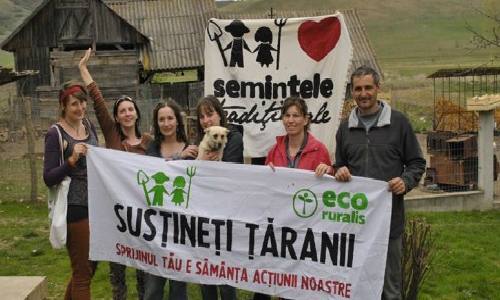
International Day of Peasants’ Struggles against TTIP
Eco Ruralis take the global local in Romania for peasants and against TTIP. With Laetitia Nourry […]

Eco Ruralis take the global local in Romania for peasants and against TTIP. With Laetitia Nourry […]
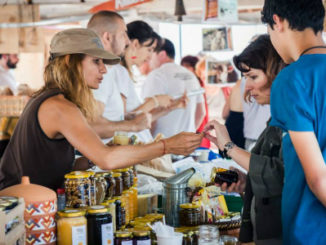
Another way to do food is possible. And its here. Friends of the Earth Europe’s “Eating from the Farm – the social, environmental, and economic benefits of local food systems” show us inspirational examples of where you can shake the hand that feeds you, all around Europe. This new publication explores the many myriad benefits of short food supply chains, and how they function in few countries in the EU. It “features five case studies which illustrate different ways in which communities are finding more sustainable ways to produce and consume food with benefits for all” FOEE say about the publication . They continue “The methods vary, but the outcomes are the same: control of the food system is being taken back by small-scale, sustainable farms and food enterprises from large-scale industrial businesses that dominate the market today putting profit ahead of well being for people and planet.” The milestone of more urban than rural dwellers reached globally as long ago as 2007. This, coupled with a the twin demands of the sustainable use of resources and […]
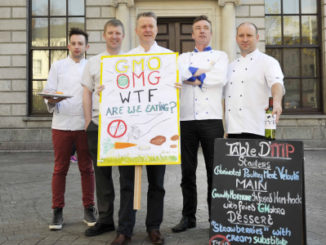
Saturday 18th April was the Global Day of Action for sharing information, raising public awareness and staging demonstrations against TTIP. Seven events were organized in Ireland and over 700 took place around the world, involving a diverse range of civic agencies, social and environmental NGOs and many other interested parties. In Ireland this included chefs, led by the non-profit chefs’ organization Euro-Toques Ireland. In the weeks leading up to it big names including Jamie Oliver and Darina Allen spoke out from the chefs’ corner, voicing their concerns for the future of food and agriculture in the European Union should the TTIP treaty be ratified. “The Transatlantic Trade and Investment Partnership (TTIP) agreement poses a serious threat to the well-regulated Irish and European food industry,” said Darina Allen in a statement from Slow Food Ireland last week. “Who will benefit from this agreement? It will certainly not be consumers, who will see food information further weakened over longer food supply chains, nor will it be the large majority of small-scale producers, serving local markets, who make […]
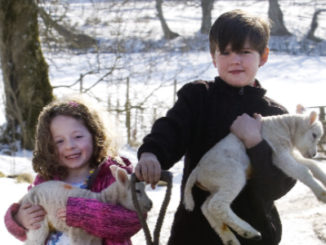
Whitmuir Community Farm, a few miles south of the Scottish capital Edinburgh is selling itself to the local community. Literally. For a couple of years now, Whitmuir Community Benefit Society has been selling shares in the working organic farm, with a view to securing the future of the educational work that already goes on there. “Transferring the land from private ownership to community ownership not only protects the long term future of the farm, but also allows greater collaboration with the educational and science sectors than is currently possible and enables the development of accommodation and teaching facilities on site,” explains Pete Ritchie, director of Nourish Scotland, who is currently farming Whitmuir with his partner, Heather Anderson. The process of selling shares was launched in 2013, with the first share being bought for then five-year-old Maya by her family. The launch event was also attended by the Scottish Parliament’s Cabinet Secretary for Rural Affairs, Food and Environment, Richard Lochhead (pictured below, with Maya). There are now 14 shareholders under the age of 16 and the […]

Guest post by David Cronin What is the real objective of the Trans-Atlantic Trade and Investment Partnership (TTIP)? We can get a good idea from watching a video recorded recently in Brussels. It features Cecilia Malmström, the European commissioner for trade, defending highly controversial plans to usher in a court system whereby corporations could sue against government decisions they do not like. According to Malmström, “companies need to have some sort of protection” against such issues as “nationalisation”. Intentional or not, that statement illustrates how the key negotiators of TTIP are in thrall to a right-wing ideology. The idea that certain economic activities could be nationalised – placed under public ownership – is anathema to them. TTIP would be a legally-binding accord effectively saying that capitalism is the only permissible system in the European Union and the United States. In the same video, Malmström insists she has “no secret agenda”. And to be fair, the Swede has been slightly more transparent than the EU’s previous trade chiefs. The irony is that the modicum of transparency she has […]
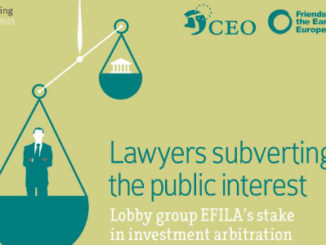
Today 14th April is a big TTIP day in Europe. In the Parliament you can follow the debate live here. Here are the amendments being voted on. Politicians of all hues are suggesting amendments. Ag will feature at 15.00 CET. Here is the debate sequence for today: ENVI: Tuesday 14th April, 09:00 AM CULT: Thursday 16th April, 09:00 AM JURI: Thursday 16th April, 10:00 AM AFCO: Thursday 16th April, 10:00 AM PETI: Thursday 16th April, 10:00 AM AGRI Tuesday 14th April, 15:00 PM Also today TTIP-related events 1: Sharon Anglin Treat (Maine Citizen Trade Policy Commission) at 12.30 CET Parliament presentation. Treat will focus on: The EU regulatory cooperation proposal in TTIP; Clues to the US regulatory proposal in TTIP; US experience with domestic regulatory coordination (OIRA) and cost-benefit studies; food democracy at risk – how regulatory cooperation and coherence will promote large scale industrial agriculture, weaken and delay food safety and pesticide protections, jeopardize the precautionary principle and attack the value of subsidiarity. UPDATE: Watch Sharon Treat in this short video from the talk explain […]
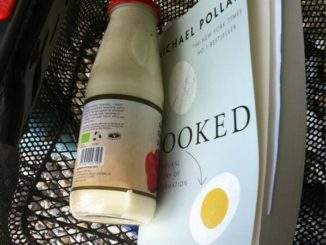
Guest post by Siobhan o Donoghue of Uplift The milk quota system across Europe came to an end on April 1st. Listening to the dominant media and political commentary in Ireland you could be forgiven for thinking that this landmark event heralds the beginning of great things for farming and farmers. In fact the ending of the famous milk quota system just accelerates the race to the bottom for sustainable farming. The deregulation of milk production risks destabilising the market. Farmers will find it harder to secure a fair price for milk as corporate businesses become more powerful and gain more control of the market. Smaller farming families will find it more difficult to stay in business and out of debt because of inevitable fluctuations in milk prices. The Irish government’s Food Harvest 2020 Strategy predicts that milk production will increase by 50% with the removal of milk quotas. Agriculture is Ireland’s largest contributor to overall Greenhouse Gas (GHG) emissions, accounting for over 30% of our total GHG emissions. By 2020, emissions from the agriculture […]
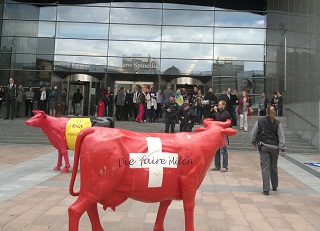
After 1 April, the European milk market will have no operating safety net. For the dairy farmers in Europe this means more, worse crises and falling prices in future. Many of them will have to give up milk production completely; regions throughout Europe will be affected. As milk production will no longer be possible in many regions, consumers will have fewer possibilities in future for buying regional products. The diversity of dairy products will vanish. That is why the dairy farmers are demanding that the European politicians put in place a working crisis system enabling crises to be predicted and prevented. The “Market Responsibility Programme” (MRP) could be the solution. What can dairy farmers expect after the beginning of April? On 31 March 2015, the milk quotas that have operated for more than 30 years will come to an end – the system for the time after that evinces considerable deficiencies. It is to be assumed that dairy farmers in many EU countries will initially step up production. Demand will not be able to absorb […]
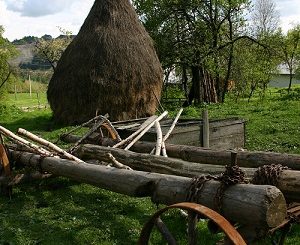
According to recent figures released by Eurostat, Romanian agriculture is highly unbalanced. That is not the big surprise. In the last 20 years the country’s agricultural landscape was in a continuous transformation; agrarian reforms without a long term vision, real estate and agribusiness “cowboys” from all over the world speculating on low prices, productions focusing mostly on export commodities…all in a country of peasants versus their institutional neighbours. The surprise lies in how different stakeholders interpret these figures. Let’s have a look. According to the EU analysis, Romania is the 8th agricultural power of Europe and for the year of 2014 has an agricultural production estimated to 15.5 billion Euro (1160 Euro/hectare). Poland was the only other ex-communist country which outranked Romania having a 22.5 billion Euro (1660 Euro/hectar) production. The top ranks go to France, with its 70.5 billion Euro and Germany – 51 billion Euro production. Where is the great unbalance? Crop production amounts for 73% of the total, 26% being attributed to animal farming and only 1% represents agricultural services. On the […]
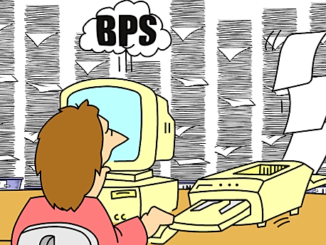
With just seven weeks to go before the May 15 deadline for applications under the Basic Payments Scheme (BPS) the UK government has climbed down from its dogmatic commitment to digital by default. The Rural Payments Agency (RPA) will still require farmers to register online, but is making preparations to input data from paper forms. RPA chief executive Mark Grimshaw welcomed the possibility of more time for BPS claims, with the European Commission’s offer of an extended deadline of June 15. This was made by European agriculture commissioner Phil Hogan. According to the RPA, “over 80%” of English farms have registered. Meanwhile, the RPA is providing mobile units to reach isolated farmers, in addition to its 50-strong network of drop-in centres. Around 15,000 eligible farmers still need to register. Tenant Farmers’ Association (TFA) chief executive George Dunn expressed his relief that “DEFRA has at last accepted the need to abandon its plans for online only applications,” adding that “…the RPA has been left to pick up the pieces.” During the past few weeks, his membership […]
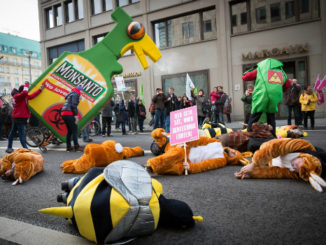
Guest opinion piece by Julia Sievers -of Agrarkoordination. This year, the EU will decide whether glyphosate – the best-selling pesticide worldwide – remains approved after 2015 for another 10 years. As a basis for this decision, German authorities – on behalf of the EU – have re-examined the risks of this pesticide. The German authorities argue in their assessment report that glyphosate is not dangerous and recommend a re-authorization. But the official assessment is extremely controversial. A fundamental problem is that the judgement of the authorities is based almost exclusively on studies of companies that produce their own glyphosate-based pesticides and therefore have a high self-interest in positive study results. In contrast to the assessment of the authorities and the industry studies, numerous studies of industry-independent scientists have give rise to more and more doubts about the safety of glyphosate and glyphosate-based pesticide. In addition to the adverse impacts on biodiversity, water, soil and some animal species, public attention has been paid to the health risks of the herbicide. There is scientific evidence, that Glyphosate causes cancer, […]
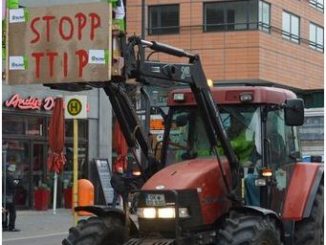
Karen Hansen-Kuhn & Hannes Lorenzen unpack the issues with TTIP & local food names in this long read. […]
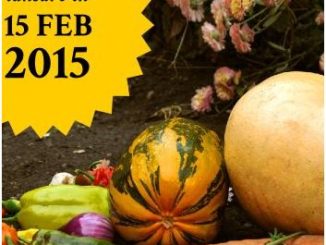
Participatory seed saving techniques are given a welcome boost in Romania, with the 2015 Eco Ruralis seed catalogue […]

Land acquisitions in Romania are turning rural areas into socio-cultural deserts.And more. With Attila Szocs of Eco Ruralis. […]
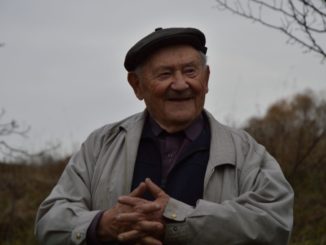
Written By: Derek Freitas, Food Chains Campaign Coordinator for Eco Ruralis General Context The word “peasant” is used in all sorts of ways to mean different things by many groups of people across the world. It is indeed very hard to define. This is particularly problematic due to the fact that the majority of decision-makers related to establishing agricultural policy at the national, EU and global levels don’t have an accepted reference point for understanding one another in a basic sense. Often, the only time when self-ascribed “peasants” feel that they are accurately portrayed is when they explain what that word means to them. But, again, even they disagree based on cultural, historical, geographical and individual differences. Global Context The international peasant movement, La Via Campesina, calls for an International Convention on the Rights of Peasants and states the following in Article I of its own “Declaration on the Rights of Peasants – Women and Men”: “A peasant is a man or woman of the land, who has a direct and special relationship […]
Agricultural and Rural Convention